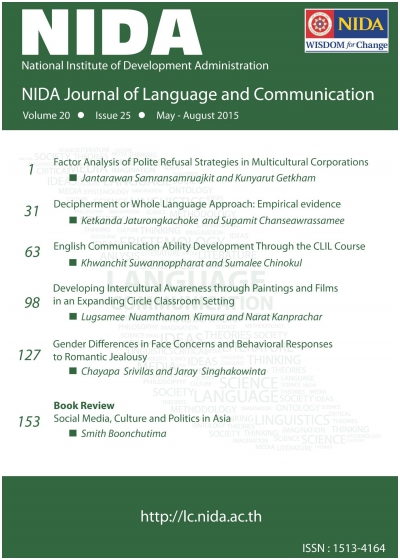ENGLISH COMMUNICATION ABILITY DEVELOPMENT THROUGH THE CLIL COURSE
Keywords:
English communication ability, Content and Language Integrated Learning (CLIL), undergraduate students, international programAbstract
The demand for English proficiency in communication in both social and academic contexts in Thailand has been increasing. As a weakness in English skills may cause the loss of job and educational opportunities, many Thai universities provide international programs to provide their students with opportunities for advancement in higher education and future careers. Nevertheless, English is a friend and foe of Thai students because they are learning English in an unsupportive environment – English is only used in the classroom. More opportunities to use the English language in a wider learning process in and outside the language classroom are therefore crucial. The Content and Language Integrated Learning (CLIL) approach was thus selected to design a course which aims to develop the English communication ability of the Thai undergraduate students in the international program under focus in this study, since CLIL is in instructional approach that encourages the use of an additional language (usually a target language) in the learning process. The Thai undergraduate students in the Chinese International Program of the Faculty of Liberal Arts, Prince of Songkla University, Hat Yai Campus were selected as research samples for this study. A pre and post-test were used to investigate the effectiveness of the CLIL course to develop the English communication ability of the students. An opinion evaluation questionnaire and an in-depth interview were used to identify the students‘ opinions of the CLIL course. The research findings show that the post-test scores were significantly higher than the pre-test scores which represents an ability development in the English communication skill the undergraduate students. Moreover, the results of the opinion evaluation questionnaire detail the positive opinions of the students towards the CLIL course in developing their English communication ability. These interview results also helped confirm the effectiveness of the CLIL course in developing Thai undergraduate students‘ English communication ability.Downloads
How to Cite
Issue
Section
License
By submitting a manuscript, the author transfers the copyright for the article to School of Language and Communication, National Institute of Development Administration (NIDA), if and when the manuscript is accepted for publication. Though the journal is an open-access, reproduction of any material published in NIDA Journal of Language and Communication for non-personal and/or commercial purpose requires a written permission from School of Language and Communication, National Institute of Development Administration (NIDA).






